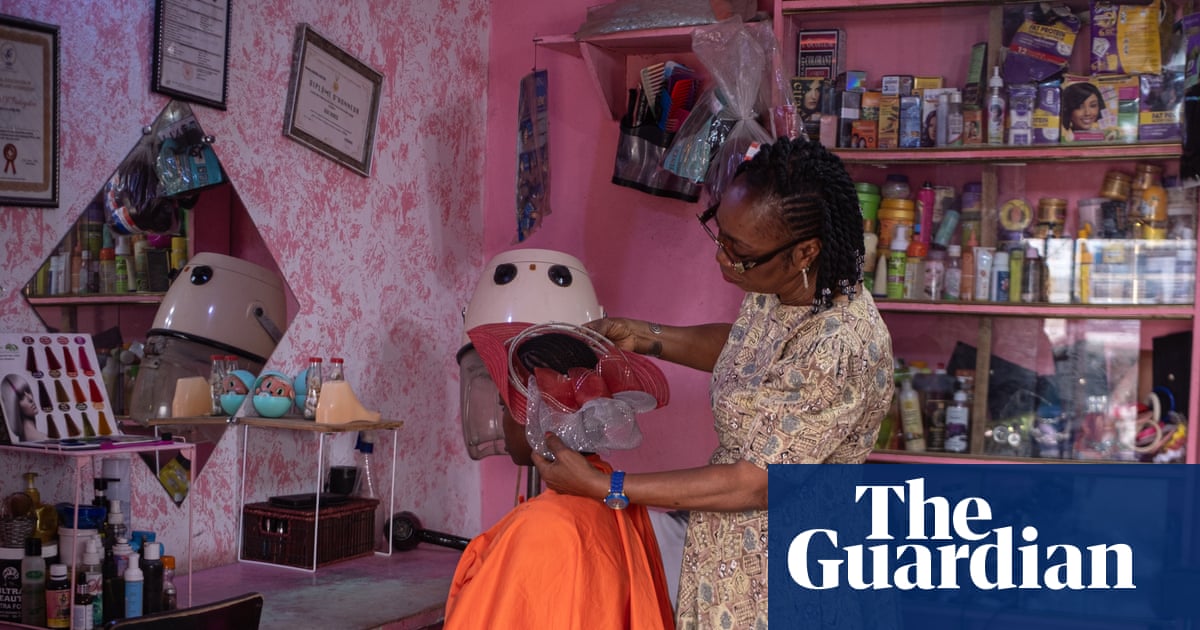Yopougon, the largest of Abidjan’s 13 communes, with a population of 1.5 million, is known for its entrepreneurial grit, its bubbly nightlife and, in pop culture, as being the birthplace of Francophone Africa’s most popular comic character, Aya de Yopougon.
Beneath the bustle, it is also home to another taboo-busting pioneer: 49-year-old Adjoua Catherine Tano, a hairdresser who has spent two decades offering mental health advice, or just listening quietly as she cuts her clients’ hair.
A school dropout who tried out as a bank cashier before becoming a hairdresser, Tano’s resilience recently came in handy when speaking to a teenager worried about failing their exams. “I told her: ‘Don’t think negatively,’” Tano said. “‘Even if you fail, how can you think that you have failed in life?’”
Mental health remains a taboo subject in most parts of Africa, even though according to the World Health Organization more than 116 million people have mental health problems on the continent. Therapy is in critically short supply, with 1.4 mental health workers for every 100,000 people.
Across Black communities, hairdressers have become a safe space, especially in communities with little or no access to mental health care – or quality healthcare in general.
Bluemind Foundation, a nonprofit organisation working across Cameroon, Ivory Coast and Togo, has plugged into the hairdresser-client relationship through its Heal by Hair initiative. According to its founder, Marie-Alix de Putter, more than 400 hairdressers, including Tano, have been trained in the last two years to act as therapeutic first responders or “mental health ambassadors”, reaching more than 100,000 women. By 2030, de Putter hopes to reach more than 1,000 hairdressers in 20 countries.
‘The trust is already there’
It began with a love story that turned tragic. In 2012, while the de Putters were on a trip to her native Cameroon, her husband was murdered. She became a widow while she was four months pregnant. The case remains unsolved.
“I spent my first night as a widow with my hairdresser,” she said. “She was the one I trusted the most that night because you’re just surrounded by people and you don’t know who could have done this … so we had this relationship where every week she would come and do my hair [initially] at home and listen.”
Inspired by her personal story, the foundation conducted a 2021 study across seven Francophone countries: 77 % of responders confessed to confiding in their hairdressers, and more than 90% of hairdressers said their clients had sought their counsel.
“We just connected the trust that women are already giving to their hairdressers with the tools,” she said. The first training took place in April 2022.
The programme is structured around a free, intensive three-day training with psychiatrists and mental health experts who teach the women about active listening, gender-based violence and signs of depression – as well as psychology theories. Afterwards, they are evaluated before receiving a certificate.
“The training went very well … I got my diploma and this,” said another hairdresser, Thérèse Gueu, as she reached for a psychology textbook on a shelf in her salon in the working-class neighbourhood of Abobo.
Over six months, trainees are supported through peer groups and access to a psychological referral system. When a client shares deeper troubles, hairdressers refer their clients to professional psychologists, or in cases of domestic violence, to the police. Many still bristle at the thought of either, citing financial and societal costs of doing so in a conservative region where one in three people live in extreme poverty.
Initially, funding for the programme came mostly from de Putter’s savings, but private donors and agencies like France’s Development Innovation Fund now chip in. Nevertheless, the resources remain small for the amount of work facing the foundation’s small team of 17 paid staff and about 100 volunteers.
Their work has yielded stories of joy and healing: in Togo, one trainee hired someone who had been in a psychiatric hospital, offering social rehabilitation.
“Often when you’ve been sick and you’ve been hospitalised, people say you’re crazy,” said de Putter. “So if you have a job and someone who accepts to train you, you get out of the taboo.”
One hairdresser left her home because she was a victim of violence, but now helps people. In some communities, hairdressers say a few men have started reaching out for counsel too.
Among the hairdressers, there is a general sense of fulfilment over their emergence as a form of emotional support in their communities. “[When] people come to explain their problems to me, it’s a pride for me too because I know that I am an ear for someone,” said Gueu. “I tell myself that we all need someone.”
“For many of these women, it’s their first recognition as a leader in their community and a protector,” said de Putter. “These women are saying to us: ‘Before I was just doing hair, now I do healing.’”

